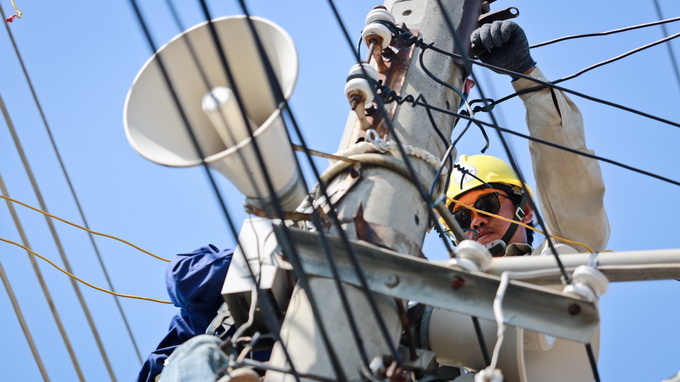Three state-run conglomerates, which are involved directly or indirectly in power generation, are seeking for permission from state management agencies to raise power price, saying that the devaluation of the local currency earlier this year has worsened their balance sheets.
>> An audio version of the story is available here
The Vietnam Electricity (EVN), Vietnam National Coal Mineral Industries Group (Vinacomin), and PetroVietnam (PVN) claimed that the depreciation of the Vietnamese dong has raised their debt burden, which will only be partially offset by a hike in power prices.
The State Bank of Vietnam (SBV), the country’s central bank, on August 19 depreciated the dong by one percent against the U.S. dollar after doing so for two times previously, bringing the total devaluation of the local currency to three percent.
The latest SBV move, which is the third it has made in 2015, will help strengthen the national economy so that it can stand firm amid any international financial turbulence, deputy governor Nguyen Thi Hong said.
Earlier this year the central bank announced that it would not devalue the dong by over two percent in 2015.
The dong depreciation has caused a VND1.2 trillion (US$52.8 million) loss for those thermal power plants built and managed by Vinacomin, Vu Anh Tuan, the firm’s deputy general director, said in a meeting between the three state-run behemoths and the Ministry of Industry and Trade earlier this month.
Meanwhile, Ngo Son Hai, deputy general director of EVN, said the combined losses incurred from the dong devaluation by the power utility and PVN may be ten times those at Vinacomin.
But Deputy Minister of Industry and Trade Do Thang Hai said at the meeting that though the devaluation may result in losses for the three state-owned firms, their proposal on raising power prices must be submitted to the central government for a green light.
Ho Cong Ky, chairman of the board of directors of PetroVietnam Power Corporation, told Tuoi Tre (Youth) newspaper that almost 70 percent of the investment in local thermal plants, often costing over $1 billion each, is financed by bank loans.
Some are funded by loans worth billions of U.S. dollars, Ky said.
As a result, a $1 billion loan, which was valued around VND21 trillion, has become VND22 trillion since the dong depreciation.
Increased debt repayment obligations mean more costs, so without any price hike, the investors will run into losses, the chairman added.
Representatives of the Ministry of Finance and the Ministry of Industry and Trade and many experts told Tuoi Tre the losses brought about by the dong depreciation, if any, cannot be all included in the proposed price increase, as a power price hike will have a knock-on effect on the pricing level of the economy.
Dang Quyet Tien, deputy head of the Corporate Finance Department under the Ministry of Finance, said existent regulations stipulate that losses due to exchange rate differences will be included in the cost of production and they are amortized over five years.
The Ministry of Industry and Trade and the Ministry of Finance are advised to determine at which rate the losses will be offset and included in electricity price, Tien added.
Dr. Nguyen Duc Thanh, director of the Vietnam Economics and Policy Research Institute (VEPR), said the Vietnamese dong has been actually devalued by around five percent so far, referring to the SBV’s widening the trading band of dong-dollar transactions by two percent last month.
According to the VEPR’s preliminary calculations, all this is able to make electricity cost increase by less than two percent.
Meanwhile, for operational power plants, even with very large investments, they are often financed by long-term loans, approximately 20-30 years, Dr. Thanh said.
He added that losses resulting from exchange rate fluctuation should be offset during the entire term of the loans, instead of only one year with just a price rise.
Like us on Facebook or follow us on Twitter to get the latest news about Vietnam!


















































